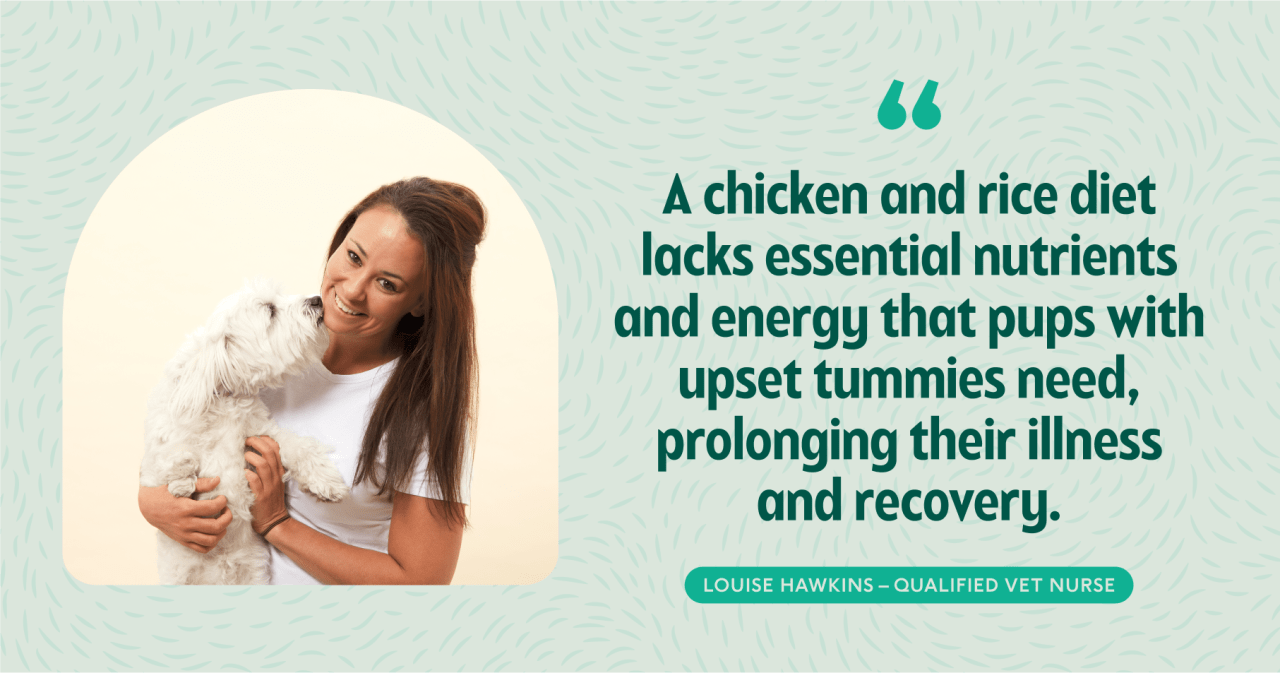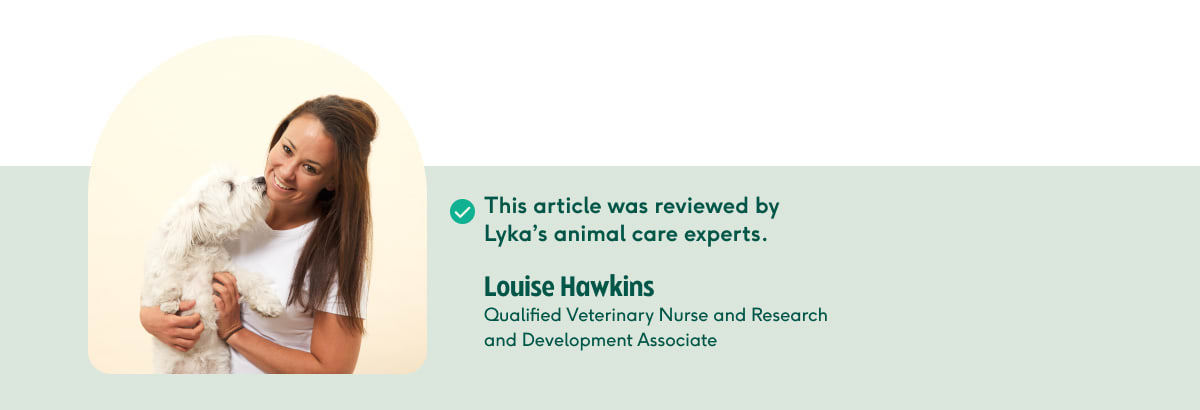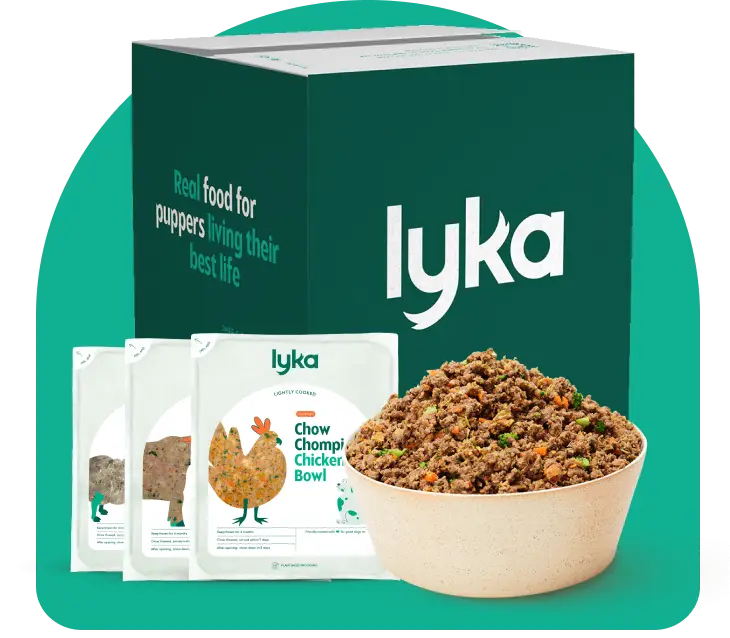Nourishing your sick dog naturally (it’s not chicken and rice!)

By Helen Knight

Upset tummies are the worst! It can be so hard watching your pup struggle with vomiting or diarrhoea (or both).
Let’s work together to help your best bud get their bounce back.
In times like these, a holistic approach is best. Start with the basics: a cosy bed to rest in, fresh water and lots of TLC.
When it comes to food, your pup still needs to eat when they’re sick, but chicken and rice is simply not nutritious enough.
So, what should you feed your dog when they’re sick? Let’s take a closer look at how natural nutrition can help to soothe their upset stomach.
Wholefoods for upset stomachs
When we have a bad tummy, we usually eat simple food that won’t unsettle our stomach — it’s the same for our dogs.
The chicken and rice combo is often the default because it’s bland and digestible, but it’s deficient in energy and vital nutrients needed for a full and speedy recovery.

“When a dog has an upset stomach, they’re less able to absorb nutrients from their food as it passes through their digestive tract too fast, due to vomiting or diarrhoea. A chicken and rice diet lacks essential nutrients and energy, prolonging their illness and recovery.”
Louise Hawkins, Qualified Vet Nurse and Research and Development Associate at Lyka
Chicken is also a common canine allergen and can trigger more vomiting and diarrhoea — the last thing you want for your pup’s delicate tum.
Choose lightly cooked, human-grade ingredients like lean protein, pumpkin or sweet potato, and a delicious bone broth as a more nutritious alternative to rice and chicken.
Once they’ve made a full recovery, you can gradually reintroduce their normal food. Until then, give these a go:
Cooked butternut pumpkin or sweet potato
Pumpkin and sweet potatoes are easy to digest and an excellent source of dietary fibre to regulate your pup’s bowel movements and alleviate diarrhoea.
Sweet potatoes are rich in vitamins A and C, and potassium to support the immune system and overall health. Their natural anti-inflammatory properties can help to soothe an irritated digestive system — ideal for dogs with an upset stomach.
Both pumpkin and sweet potatoes can provide an energy boost which is great for lethargic pups with a reduced appetite.
The best way to cook your pumpkin and potato is to steam or roast them without any oil or seasoning — keep it simple, delicious and nutritious.
Lean poultry protein
Free-range chicken or barn-raised turkey are high-quality proteins for strong and healthy bodies.
Chicken is chock-full of vitamins like B6 for energy and niacin for digestive health. It’s also a super source of minerals like selenium and zinc that play key roles in your pup’s immune function. If your dog can eat chicken, this is a great option, but if your pup has an allergy or intolerance, try turkey instead.
Steam your lean, skinless chicken or turkey breast to maintain nutritional value and maximum taste — no need to add any oils or seasoning either!
Health-boosting bone broth
As superfoods go, bone broth is a standout! It’s a nutrient-dense soup full of protein, minerals and amino acids all vital for a healthy recovery from illness. It’s also a tasty way to rehydrate your pup and a cinch to make at home.
Bone broth recipe:
Start with a whole raw chicken, including the nutrient-rich giblets. Chicken joints are a good alternative, as long as they’re not boneless — the bones are where the goodness of collagen and gelatine comes from.
Rinse the chicken thoroughly then drain it.
Place the chicken in a large pot, with a carrot and a celery stalk. Cover with tap or filtered water.
Bring the pot to boil on medium-high heat, then reduce, cover, and simmer for 45 minutes or until the chicken is fully cooked. It’s ready when the meat pulls away from the leg bones easily—or when the internal temperature reaches 170°C.
Take the pot off the heat and let everything cool before removing the chicken and vegetables.
Transfer the liquid to storage containers and save the meat for yummy treats and meals. Keep the broth and the chicken in the fridge and use within 3-4 days or pop the soup in the freezer to use later. Chicken bones can splinter and cause injuries if eaten, so make sure everything is bone-free.
Short on time? You can also use shop-bought bone broth, as long as it’s low in sodium, fat and any other unnecessary additives.
Restoring your pup’s gut microbiome on the road to recovery
Your pup’s gut microbiome is a powerhouse of microorganisms that moderate their immune defence and process food. If they’ve been sick with vomiting and diarrhoea, their microbiome is likely to be imbalanced, compromising their digestive and immune systems further.
Restoring balance to their microbiome is an important part of their recovery and defence against secondary infections.
Probiotics like our Go-To Gut Helper can help restore the microbiome and boost their weakened digestive and immune systems. You can also feed your pup a small spoonful of plain, unsweetened Greek yoghurt which is naturally full of good bacteria.
Why did my dog have an upset tummy in the first place?
Feeling sick is the pits. If you can pinpoint the root of the problem, you may be able to avoid a repeat. Let’s take a closer look at seven common causes of upset stomachs with advice on treatment and prevention. Check out our poo and vomit guides for helpful visual charts on what to look for.
Common causes:
Dietary changes: If your dog eats the same food every day, their digestive system gets used to processing a limited diet. If this changes suddenly, it can disrupt the balance of bacteria that creates the microbiome, leading to gurgly guts and tummy troubles. If you’ve decided to change their diet, a gradual transition between their original food and new food is advised.
Food intolerance or allergy: Food allergies are rare in dogs. If food is the problem, it’s more likely to be an intolerance to a particular ingredient. A vet-supported elimination diet is the only way to identify the problematic food, but you can choose a diet that’s free from common allergens.
Ingestion of inedible items: Whether it’s a wrapper snaffled from discarded food at the dog park or a case of pica (a compulsive urge to eat inedible things), ingesting non-food items can trigger an upset stomach.
Your dog’s natural defence system will try to eject unwanted items and it’s often better out than in, but there may be pathogens present that can cause a longer illness.
Monitor your pup closely and contact your vet if they have more than two episodes of vomiting or diarrhoea in a 24-hour period. If their dietary indiscretion continues, consult your veterinarian for advice.
Bacterial or viral infections: Bad bacteria or viruses can trigger your dog’s immune system and disturb the balanced microbiome in their gut. Drinking from puddles or shared water bowls, eating contaminated food or interacting with other dogs can transmit pathogens to your pup.
Vigilance can avoid some hazards, but sometimes infections are unavoidable. Make an appointment with your vet if you are concerned about an infection.
Pancreatitis: The pancreas releases digestive enzymes and hormones like insulin and glucagon. Vomiting and diarrhoea are common signs of an irritated and inflamed pancreas (pancreatitis) caused by diet, toxins or injury. Pancreatitis can be idiopathic (no known cause), or it can be triggered by factors like diet, hormone imbalance, toxins, medication, injury, or obesity. Feeding your pup a fresh food diet can provide nourishment without pro-inflammatory ingredients that can cause pancreatitis.
Stress and anxiety: Stress signals your dog’s adrenal gland to release adrenalin and cortisol that redirect blood flow away from their digestive system to the ones vital for their fight or flight response. This slows down their digestion leading to indigestion, irritation and inflammation.
Stress and anxiety can also increase the speed of gastrointestinal motility, which is the movement of food through their digestive system, causing loose stools. One of the leading causes of colitis (an inflamed and irritated colon) is stress, resulting in diarrhoea. Understanding and removing your dog’s triggers can alleviate their feelings of stress.
Parasites: Parasites, like worms, can be quite common, especially in puppies. We suggest going to the vet if your pup has been vomiting for more than 24 hours, not eating or drinking water.
Parasite prevention with regular medication is an effective way to minimise the risk.
Real food for good gut health
Are upset tummies a regular problem for your pup? This could mean an unbalanced gut and a weak immune system. A fresh food diet is a great way to boost their microbiome and bolster their immune defence.
Want to know more? Read how fresh food helped Louie bounce back to full health.

This article was reviewed by Lyka’s animal care experts.
Reviewed by:
Louise Hawkins, Qualified Veterinary Nurse and Research and Development Associate







